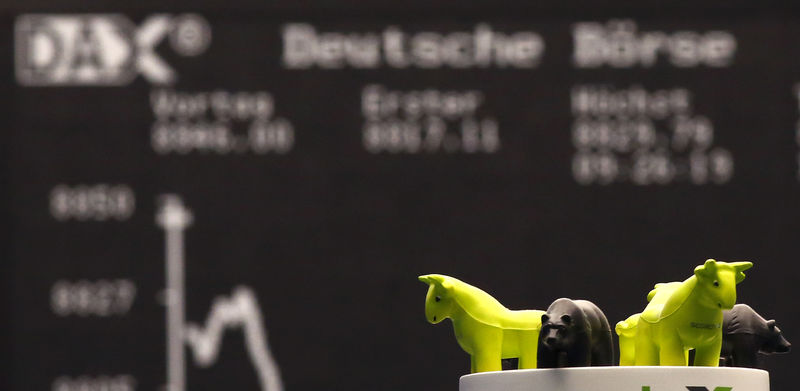By Peter Nurse
Investing.com - European stock markets are expected to open lower Wednesday after disappointing Japanese trade data, while a U.K. inflation release pointed to a Bank of England rate hike in December.
At 2:05 AM ET (0705 GMT), the DAX futures contract in Germany traded 0.1% lower, CAC 40 futures in France dropped 0.2% and the FTSE 100 futures contract in the U.K. fell 0.5%.
U.K. consumer prices rose 4.2% on the year in October, data showed earlier Wednesday. This represents a sharp jump from 3.1% the previous month and is more than double the central bank’s medium term target of 2%. Following on from Tuesday’s strong employment data, this release may well provoke an interest rate hike from the Bank of England next month.
The equivalent inflation data from the Eurozone is due later in the session, but the European Central Bank has guided towards a more patient stance in terms of rate hikes.
The major equity indices in Europe received a negative handover from Asia, after Japan's exports snapped seven months of double-digit growth in October, growth slowing to only 9.4% year-on-year.
Global supply constraints hit Japan's major manufacturers, particularly the country’s car industry. Such trends have already been evidence in the Eurozone, where German industrial output and exports have weakened sharply in the last three months.
In corporate news, quarterly earnings come from the likes of Sage (LON:SGE), British Land (LON:BLND) and Experian (OTC:EXPGF).
Elsewhere, Nokia (NYSE:NOK) will be in focus after the Finnish telecommunications company said it plans to launch a cloud-based software subscription service.
Additionally, German auto giant Volkswagen (DE:VOWG_p) announced plans to double staff numbers at its charging and energy division, part of its aim to take on Tesla (NASDAQ:TSLA) in a key electric vehicle battleground: power infrastructure. The company's management, which has flagged the need for widespread job cuts at its conventional engine operations in recent years, is under pressure to show that the energy transition can create jobs as well as destroy them.
Crude prices weakened Wednesday after the release of a report on U.S. inventories increased the pressure on the Biden administration to tap its strategic reserves.
The industry-funded American Petroleum Institute reported U.S. crude inventories rose 655,000 barrels last week, but gasoline stocks fell by 2.8 million barrels, more than expected, an indication that final demand is still reasonably strong despite prices being at a seven-year high nationwide and at an all-time high in key markets such as California.
A coordinated release of strategic oil reserves to dampen oil prices was one of the issues reportedly discussed by Presidents Joe Biden and Xi Jinping on their telephone call on Monday.
Official figures from the Energy Information Administration are due later Wednesday.
By 2:05 AM ET, U.S. crude futures traded 0.7% lower at $79.22 a barrel, while the Brent contract fell 0.6% to $81.93.
Additionally, gold futures rose 0.2% to $1,857.10/oz, while EUR/USD traded 0.2% lower at 1.1303.
